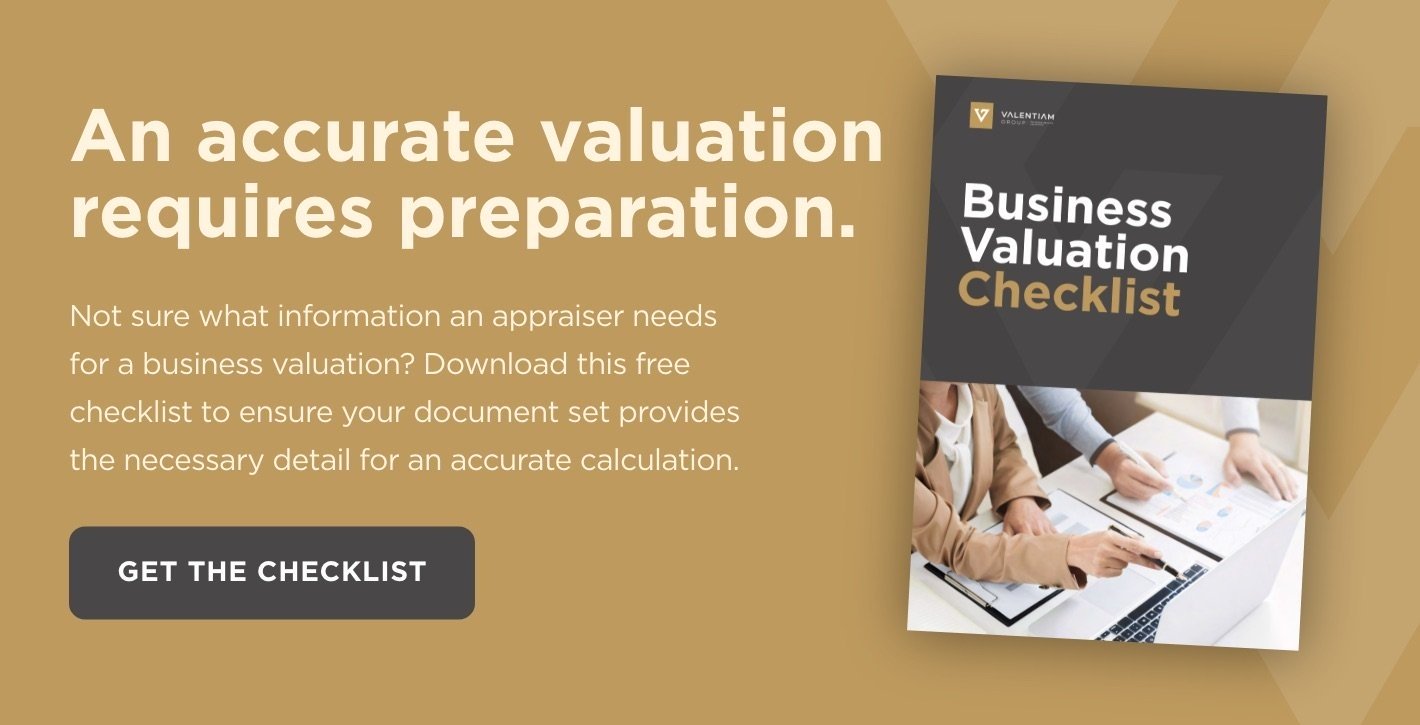When Is There Need For A Business Valuation? The Top 9 Reasons
Posted by Valentiam Group on November 13, 2020

Almost every business that is a going concern will have a need for a business valuation at some point, whether it’s related to the sale of assets or shares in the business, sale of the enterprise through merger or acquisition, tax issues, or litigation requiring an accurate valuation.
A professional valuation is more than an educated guess or a ballpark estimate. It takes into consideration the value of business assets (both tangible and intangible), as well as the company’s past performance and potential for future growth and profitability. The bottom line is that value is money, and most of us can’t afford to leave it on the table; a professional valuation is crucial for getting your money’s worth, whether that is in a purchase or a sale. If you are uncertain as to whether or not you need a professional business valuation, the scenarios outlined in this article will demonstrate why professional valuation is important for all types and sizes of businesses.
Download our free Business Valuation Checklist to learn about the information you need to calculate an accurate value for your business.
When is there a need for a business valuation?
Whenever there is a transaction involving a company’s assets, whether it is the sale of assets, shares, the sale of the enterprise itself, or the sale of goods or services between business subunits, valuation is needed to satisfy the proper discharge of fiduciary responsibility (i.e., making sure you don’t leave money on the table). This is particularly important when you are making decisions affecting other people’s money, as in a company with shareholders.
9 Scenarios When Valuation Is Required
- Transfer pricing: Valuation for the purpose of transfer pricing—when one subsidiary of a company provides goods, services, or intangible property to another subsidiary—can help the company with strategic planning, by identifying ways to maximize efficiencies. IRS guidelines are the primary reason why valuation is required for transfer pricing, whether in a tax compliance or tax planning environment. Professional valuation for intercompany transactions in the context of a company’s overall tax strategies is also critical.
- Property tax: Across the country, property tax is based on the value of the tangible assets (in some cases intangible), and is a large burden on businesses. A valuation of taxable property can provide support to help taxpayers make sure they are paying their fair share. .
- Business or legal restructuring/Marital dissolution: Businesses can extract strategic benefits, tax savings and operational cost savings by restructuring. It is important for assets and intercompany transfers to be properly valued to maximize both tax benefit and limit exposure.
- Litigation support: A professional valuation can often obviate litigation; a settlement based on an accurate fair market value can be negotiated. If the matter proceeds to trial or arbitration, the expert testimony of a certified business valuation specialist will strengthen a case where the value of the business or its assets is disputed. By the same token, the absence of an independent third-party valuation in a litigation matter creates a financial risk; without an expert opinion about value, the court will be left to guess at which party’s estimate of value is correct, which may disadvantage one of the parties in the dispute unfairly. In cases involving litigation, seeking out a valuation expert with litigation experience is the best option.
- Establishing value for buy/sell agreements: Buy/sell agreements between principals in partnerships or LLCs are useful for avoiding future disputes. In order to reach an agreement acceptable to all parties, a mutually agreed upon value must first be established through a business valuation. Failure to establish fair market value and execute buy/sell agreements can lead to costly litigation in the future if a partner or member decides to exit the business.
- Mergers and acquisitions (M&A) and purchase price allocations (PPA): Company growth strategy that involves the purchase of or merger with another company requires business valuation—a PPA—to determine the fair price of the company being acquired. If a valuation by an expert is not performed, the acquiring company may end up overpaying.
- Sale of the business: If the plan is to sell the business, a business valuation will establish the fair present value of the business and aid in strategic planning to improve profitability, allowing the owners to increase the value of the business prior to sale. If sale of the business is not part of a plan but rather the result of exigent circumstances (e.g., sudden death of the owner and settlement of an estate), a business valuation can help ensure that the full value of the business is realized in any subsequent sale. Because an independent valuation of the company will most likely be necessary to close a sale, it is prudent to establish the fair value of the property before going to market.
- Determining annual per share value of an Employee Stock Ownership Plan (ESOP): Shares of Employee Stock Ownership Plans must be valued annually by an independent valuation professional to meet ERISA and IRS requirements and establish a fair stock price. Other reasons for valuation of securities include share sales, M&A transactions, sale of the business, and settling shareholder disputes. Failure to secure a stock valuation by a valuation expert can lead to penalties or litigation.
- Securing funding: Banks, venture capitalists, and other investors want to know the fair market value of the business; most will not invest without this information. An objective appraisal compiled by an independent valuation expert will help in raising capital.
Why hire a professional for valuation?Whatever your need for a business valuation, it’s important to hire a professional to get it done right; otherwise, the reporting won’t match up with the audit, which is a particular problem if the company is public. Failure to assign proper values to assets creates a liability; shareholders may sue for neglect of fiduciary responsibility. In transfer pricing scenarios as well, there are stiff penalties for failure to accurately value transfers. It’s critical to have an experienced valuation professional to avoid liability (and potentially, large fines) and properly discharge fiduciary duty. A valuation expert knows the rules and regulations which must be followed in transfer pricing; following these guidelines demonstrates due diligence and offers some protection against fines and liability. Ultimately, the most important reason for relying on an independent, certified business appraiser for a valuation is money, which is hard to come by and easy to lose. Even for a small sole proprietorship, the value of the business represents significant investments in time, money, and effort; it simply doesn’t make sense to give away value that has been built with your hard work. No one goes to work each day with the goal of building wealth for a complete stranger. A business valuation compiled by an expert appraiser will help to ensure that you receive the fair value of your business assets in a sale or settlement transaction;, that you do not overpay if you are purchasing a business or partial ownership of a business;, and that you are not subject to over-taxation, fines, or penalties for failures of due diligence. |
Need help determining the value of your business or business assets?
Valentiam has helped companies in a variety of industries attain accurate enterprise and asset valuations. We have extensive experience in the application of all valuation methods for a broad range of businesses and situations. Our valuation and transfer pricing specialists have worked with some of the largest companies in the world.
Contact us to see how we can help your company with your valuation and transfer pricing needs.
Topics: Business valuation
Related Posts
EBITDA Multiples By Industry: An Analysis
EBITDA multiples by industry indicate growth, profitability, and stability of profits in various sectors—and are a quick and easy way to estimate value.
Valuation Methods: A Guide
Different types of business valuation methods are suited to specific needs. Here are the three primary types of valuation techniques and when they should be used.


